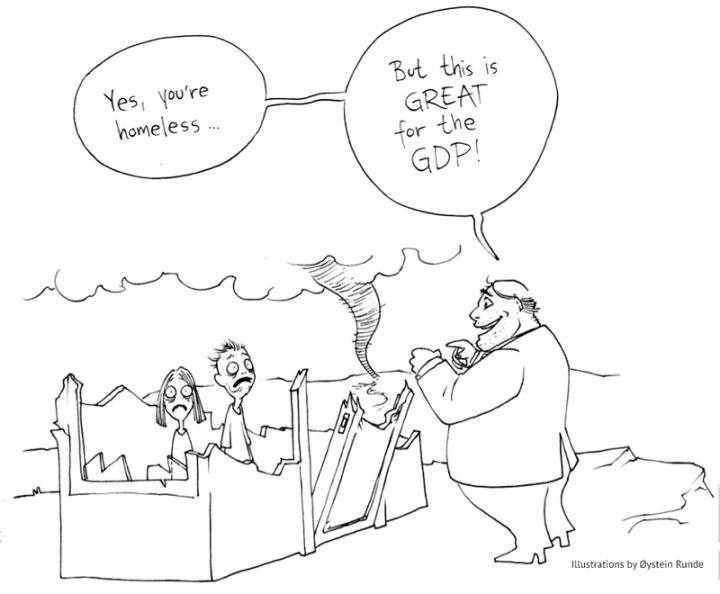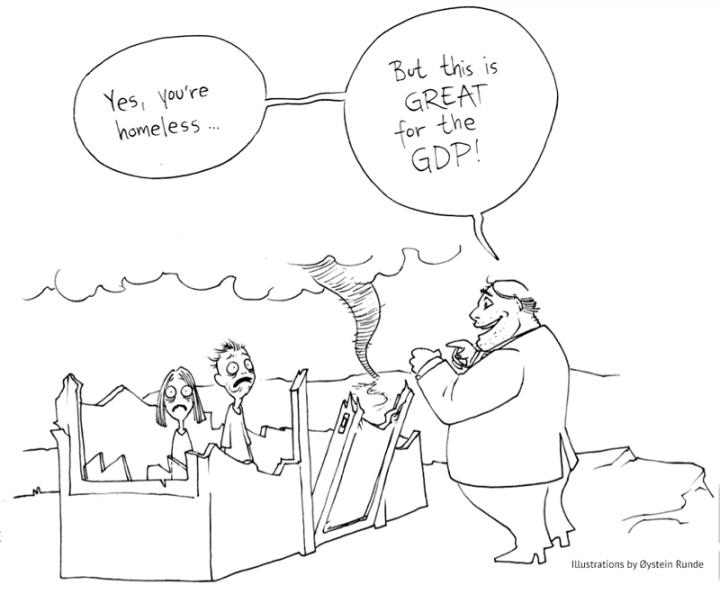
Credit: University of Surrey
A new report from the Club of Rome is to be launched today. 'Reinventing Prosperity' by Graeme Maxton and Jørgen Randers focuses on three endemic social challenges — inequality, unemployment and climate change — and offers 13 radical policy solutions for industrialized countries to address these problems.
The launch is hosted by the ESRC Centre for the Understanding of Sustainable Prosperity (CUSP) as part of their ongoing public dialogue on the Nature of Prosperity. Prof Tim Jackson, Director of CUSP said: "Reinventing Prosperity picks up directly from the Club of Rome's seminal work on the limits to growth. Its message is both radical and pragmatic, offering hope to those left behind in the 'global race for growth'."
Reinventing Prosperity argues that, despite more than 30 years of economic growth, the well-being of much of the global population has not improved. The gap between rich and poor has widened, millions remain without work and real wages in many countries have stagnated or fallen. "Continuing on the current, growth-dominated economic path is not just wrong, but extremely foolish. It will worsen the problems not solve them," said Jørgen Randers, one of the report's authors and a co-author of the Club of Rome's original Limits to Growth report.
The book offers a series of policy proposals to reduce unemployment, inequality, and climate change. These include:
- a new definition of paid work,
- fair taxation on business and resources,
- restrictions on trade when necessary,
- the introduction of a basic income for the poorest third of the population,
- increased paid vacation.
The authors recognise that some of the proposals are radical and will face opposition but remain optimistic about their adoption. "Our suggestions are feasible because they offer immediate benefits to the democratic majority," said Graeme Maxton "They not only create a better world in the long run but also provide benefits to most people in the short-term."
Reinventing Prosperity is to be launched today 28th November from 1.30 pm in Church House, Westminster. The authors will be available to sign books, following the event.
###
For media enquiries and pictures please contact:
Linda Gessner, Communications Manager, CUSP, University of Surrey, Phone: 01483 688 658 or Email: [email protected].
Ashley Lovell, Media Relations Officer, University of Surrey, Phone: 01483 686141 or Email: [email protected].
Notes for editors:
1. Reinventing Prosperity is the English translation of »Ein Prozent ist Genug« (»One percent is enough«), which immediately became a SPIEGEL bestseller when it was published in Germany on 13 September 2016. The book is published in English by Greystone Books, Vancouver: Graeme Maxton and Jorgen Randers, Reinventing Prosperity — Managing Economic Growth to Reduce Unemployment, Inequality, and Climate Change«, 240 pages, ISBN 978-1771642514, £16.99.
2. About the authors: Graeme Maxton is Secretary General of the Club of Rome and former regional director of the Economist Intelligence Unit in Asia. He is the author of The End of Progress – How Modern Economics Has Failed Us, which was nominated for the Financial Times and Goldman Sachs Business Book of the Year Award.
Jørgen Randers is professor of climate strategy at the Norwegian Business School, where he was president from 1981 until 1989 and a former Deputy Director General of WWF International. He is the author of 2052 – A global forecast for the next forty years and co-authors of the Club of Rome's landmark report The Limits to Growth.
3. The Limits to Growth was first published in 1972 and immediately became a worldwide best-seller. A recent review commissioned by the All-Party Parliamentary Group on Limits to Growth suggests that the Limits to Growth analysis is essentially robust and may even have underestimated some long-term risks to economic growth.
4. The Centre for the Understanding of Sustainable Prosperity (CUSP) aims to explore the economic, social and political dimensions of sustainable prosperity and to make concrete recommendations to government, business and civil society in pursuit of it. CUSP is funded for five years by the Economic and Social Research Council (ESRC).
5. The Nature of Prosperity is a series of public debates (hosted by CUSP) engaging young and old alike across business, policy and civil society in one of the most vital questions of our time: what can prosperity possibly mean in a world of environmental and social limits?
Media Contact
Ashley Lovell
[email protected]
44-148-368-6141
@UniOfSurrey
http://www.surrey.ac.uk
############
Story Source: Materials provided by Scienmag




